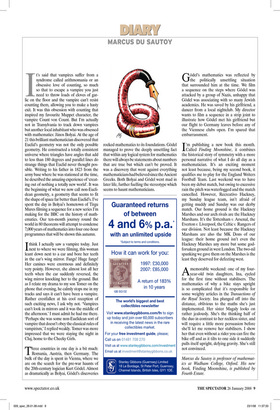I t’s said that vampires suffer from a syndrome called arithmomania
or an obsessive love of counting, so much so that to escape a vampire you just need to throw loads of cloves of garlic on the floor and the vampire can’t resist counting them, allowing you to make a hasty exit. It was this obsession with counting that inspired my favourite Muppet character, the vampire Count von Count. But I’m actually not in Transylvania to track down vampires but another local inhabitant who was obsessed with mathematics: János Bolyai. At the age of 21 this brilliant mathematician discovered that Euclid’s geometry was not the only possible geometry. He constructed a totally consistent universe where triangles have angles that add to less than 180 degrees and parallel lines do strange things that Euclid never thought possible. Writing to his father in 1823 from the army base where he was stationed at the time, he described the amazing experience of ‘creating out of nothing a totally new world’. It was the beginning of what we now call non-Euclidean geometry, a geometry that seems to fit the shape of space far better than Euclid’s. I’ve spent the day in Bolyai’s hometown of Tirgu Mures filming a sequence for a new series I’m making for the BBC on the history of mathematics. Our ten-month journey round the world in 80 theorems will attempt to condense 7,000 years of mathematics into four one-hour programmes that will be shown this autumn.
Ithink I actually saw a vampire today. Just next to where we were filming, this woman leant down next to a car and bore her teeth in the car’s wing mirror. Fangs! Huge fangs! Her canines were enormous and definitely very pointy. However, she almost lost all her teeth when the car suddenly reversed, the wing mirror knocking her to the ground. But as I relate my drama to my son Tomer on the phone that evening, he calmly stops me in my tracks and says it can’t have been a vampire. Rather crestfallen at his cool reception of such exciting news, I ask why not. ‘Vampires can’t look in mirrors and it was the middle of the afternoon.’ I must admit he had me there. ‘Perhaps she was some non-Euclidean sort of vampire that doesn’t obey the classical rules of vampirism,’ I replied weakly. Tomer was more impressed that we were staying the night in Cluj, home to the Cheeky Girls.
Three countries in one day is a bit much: Romania, Austria, then Germany. The bulk of the day is spent in Vienna, where we are on the search for the pre-war haunts of the 20th-century logician Kurt Gödel. Almost as dramatically as Bolyai, Gödel’s discoveries rocked mathematics to its foundations. Gödel managed to prove the deeply unsettling fact that within any logical system for mathematics there will always be statements about numbers that are true but which can’t be proved. It was a discovery that went against everything mathematicians had believed since the Ancient Greeks. Both Bolyai and Gödel went mad in later life, further fuelling the stereotype which seems to haunt mathematicians. Gödel’s mathematics was reflected by the politically unsettling situation that surrounded him at the time. We film a sequence on the steps where Gödel was attacked by a group of Nazis, unhappy that Gödel was associating with so many Jewish academics. He was saved by his girlfriend, a dancer from a local nightclub. My director wants to film a sequence in a strip joint to illustrate how Gödel met his girlfriend but our flight to Germany leaves before any of the Viennese clubs open. I’m spared that embarrassment.
I’m publishing a new book this month. Called Finding Moonshine, it combines the historical story of symmetry with a more personal narrative of what I do all day as a mathematician. It’s an exciting moment not least because, being my second book, it qualifies me to play for the England Writers Football Team. Last weekend was to have been my debut match, but owing to excessive rain the pitch was waterlogged and the match cancelled. However, Recreativo Hackney, my Sunday league team, isn’t afraid of getting muddy and Sunday was our derby match. Our home ground is the Hackney Marshes and our arch rivals are the Hackney Marshans. It’s the Tottenham v. Arsenal, the Everton v. Liverpool, the Celtic v. Rangers of our division. Not least because the Hackney Marshans are also the MK Dons of our league: their home ground isn’t even the Hackney Marshes any more but some godforsaken ground in west London. The two-nil spanking we gave them on the Marshes is the least they deserved for defecting west.
Amemorable weekend: one of my fouryear-old twin daughters, Ina, cycled for the first time without stabilisers. The mathematics of why a bike stays upright is so complicated that it’s responsible for some weighty articles in the Transactions of the Royal Society. Ina plunged off into the distance, oblivious to the maths she’s just implemented. Her sister Magaly looks on rather jealously. She’s the thinking half of the duo in contrast to her reckless sister, and will require a little more persuasion before she’ll let me remove her stabilisers. I show her that even without a rider you can fire the bike off and as it tilts to one side it suddenly pulls itself upright, defying gravity. She’s still not convinced.
Marcus du Sautoy is professor of mathematics at Wadham College, Oxford. His new book, Finding Moonshine, is published by Fourth Estate.










































































 Previous page
Previous page